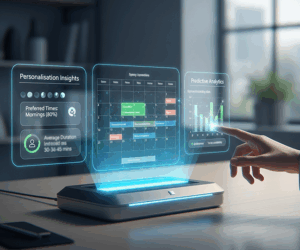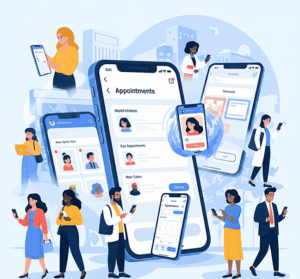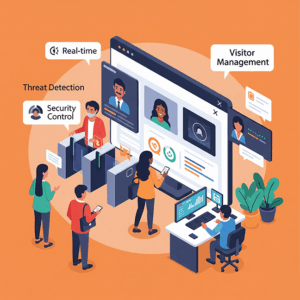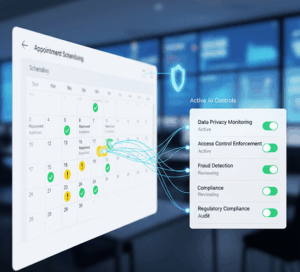
News & Updates
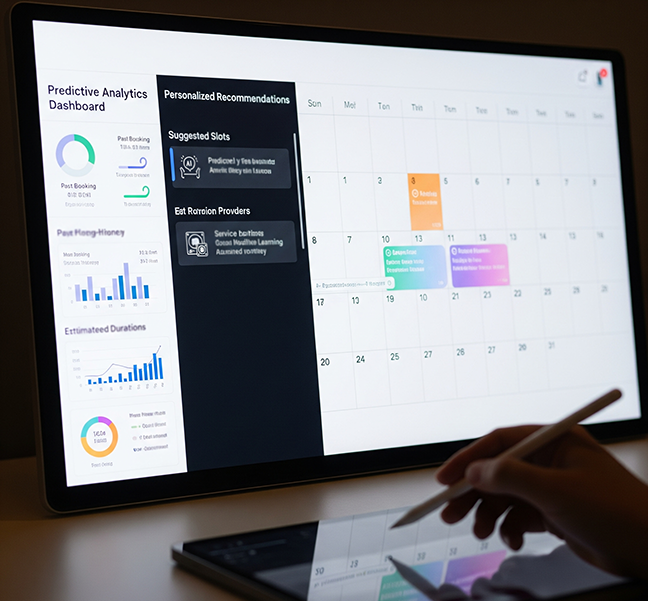
The Future of Appointment Scheduling
Appointment scheduling is on the cusp of a transformative leap as artificial intelligence (AI) becomes more sophisticated and accessible. Organisations across sectors are already experiencing the efficiency and user experience improvements delivered by AI-powered scheduling tools. These include sectors such as healthcare, government, financial services, and beyond. Tools like ATT™’s Online Resource Booking System (ORBS) are at the forefront of this transformation. As business leaders look ahead, the influence of AI in appointment management is set to accelerate, promising smarter resource allocation, seamless integration, and personalised user journeys. Drawing from current trends and expert insights, we explore the top predictions for appointment scheduling AI to help you prepare for a more connected and efficient.
Advanced Personalisation Driven by Predictive Analytics
Sooner than you think, appointment scheduling platforms will be defined by their capacity to offer deeply personalised experiences thanks to AI-driven predictive analytics. These advanced systems will move beyond static booking calendars to recommend the most suitable appointment slots for each user. This leap in personalisation is set to dramatically improve satisfaction and reduce no-shows, as users are more likely to keep appointments tailored to their routines and needs. Organisations in healthcare, government, and enterprise sectors are already seeing early gains, with platforms like ATT™’s ORBS harnessing AI to:
- anticipate peak times
- adapt to user patterns
- provide a frictionless scheduling process that meets both operational and individual expectations.
The ability to predict and respond to user intent not only enhances the customer experience but also streamlines resource utilisation. When appointment systems proactively recommend optimal times and adapt to changing demand, administrators can plan staffing and facility allocation with greater precision. This level of personalisation is quickly becoming a defining feature of future-ready digital services, empowering organisations to engage more effectively with their customers and staff alike.
Dynamic Slot Recommendations
AI-powered scheduling engines are set to take personalisation to new heights by analysing user profiles, booking histories, and external factors such as public holidays or local traffic patterns. These engines can then recommend appointment slots that best fit individual schedules, increasing the likelihood of bookings. Early implementations have demonstrated booking rates increasing by up to 30% when users are presented with suggestions tailored to their needs. The result is a smoother and more intuitive booking journey.
Reducing No-Shows with Behavioural Insights
Machine learning models will play a pivotal role in reducing appointment no-shows by identifying users at risk of missing scheduled times. By tracking patterns like frequent cancellations or habitual late arrivals, AI can trigger proactive reminders or offer alternative slots, giving users the flexibility to reschedule easily. This not only increases attendance rates but also helps organisations maximise operational efficiency by ensuring that valuable resources are not left idle due to missed appointments.
Seamless Integration with Enterprise Ecosystems
The era of standalone scheduling solutions is giving way to fully integrated digital ecosystems. As we progress into a digital era, AI-powered appointment systems will connect seamlessly with HR, CRM, payment platforms, and IoT devices, enabling end-to-end automation from booking to payment and follow- up. This integration reduces administrative workload, streamlines operations, and allows for real-time data synchronisation across multiple business functions. Solutions like ATT™’s ORBS already demonstrate the benefits of this approach, automating resource allocation and enabling organisations to respond rapidly to dynamic demands without manual intervention.
Unified digital workflows not only enhance productivity but also create a more consistent experience for users. When appointment scheduling, payments, and post-visit communications are all part of a connected platform, both customers and staff enjoy a frictionless journey reducing errors, improving satisfaction, and driving operational excellence across sectors ranging from healthcare to government services.
Automated Back-Office Workflows
AI-driven appointment scheduling will increasingly trigger downstream processes automatically, such as room assignments, staff rostering, or inventory updates. In healthcare, for example, integrating appointment data with resource management ensures optimal use of staff and facilities. This automation eliminates manual bottlenecks, reduces errors, and allows teams to focus on delivering high-quality service rather than routine administrative tasks.
Unified User Profiles Across Systems
Centralising user data ensures preferences, payment histories, and appointment patterns are accessible across platforms. This holistic view enables organisations to offer more personalised service, speed up check-ins, and respond to user needs in real time. The result is a more coherent and satisfying experience for both customers and staff, supported by consistent data flow and streamlined operations.
IoT-Enabled Smart Facilities
Future-ready appointment systems will connect with smart building platforms and IoT sensors to optimise facility management automatically. When a visitor checks in, AI can adjust lighting, air conditioning, and security systems in real time improving comfort, reducing energy costs,and enhancing overall safety. These smart integrations deliver operational efficiencies while elevating the user experience, particularly in high-traffic environments such as hospitals, government offices, and corporate campuses.
Real Time Adaptive Scheduling
With platforms like ATT™’s ORBS, organisations can respond instantly to cancellations, late arrivals, or unexpected surges in demand, reallocating appointments to maintain smooth operations. This real-time responsiveness leads to higher throughput, shorter wait times, and an improved experience for both users and staff transforming appointment scheduling from a static process into a dynamic, intelligent system.
Live Rescheduling and Traffic Balancing
AI-enabled systems will monitor live queue data, detect late arrivals or cancellations, and automatically offer alternative slots to balance workloads. By redistributing appointments in real time, these platforms help prevent overcrowding, reduce waiting, and ensure that resources are used efficiently. This is particularly valuable in high-volume environments, where managing flow directly impacts both service quality and operational outcomes.
Predictive Staff Allocation
By analysing historical trends and live demand data, AI can forecast peak periods and recommend optimal staffing levels. This forward- looking approach allows organisations to adjust rosters proactively, ensuring that neither staff nor resources are underutilised or overextended. With predictive staff allocation, businesses can maintain high service standards, even during unexpected surges or staff shortages, ultimately supporting a more resilient and responsive operation.
Enhanced Security and Compliance with AI-Driven Controls
Platforms like ATT™’s ORBS exemplify this trend, providing robust privacy protections and audit-ready logs that meet the demands of high- accountability environments. AI’s ability to detect anomalies and enforce data protection standards allows organisations to mitigate risks swiftly, maintain stakeholder trust, and demonstrate compliance with evolving regulations.
Automated Risk Detection
AI will continuously scan appointment system activity for unusual patterns such as unexpected login attempts or spikes in booking volumes and flag potential security threats. Automated alerts and rapid response protocols help organisations respond quickly to fraud or data breaches, reducing the window of vulnerability and protecting both user data and organisational reputation.
Seamless Compliance Reporting
Automated logs and real-time reporting features will simplify compliance for organisations operating in regulated sectors. AI can identify non- compliant actions, generate audit-ready reports, and provide visibility into every interaction. This streamlined approach saves time during audits, reduces the risk of regulatory penalties, and ensures organisations are always prepared for external reviews.
Conversational AI and Multilingual Virtual Assistants
The ability to offer multilingual, conversational support is particularly valuable for public sector and healthcare organisations serving diverse populations. Platforms that learn and adapt from user feedback like those envisioned in ATT™’s roadmap will ensure ongoing improvements in accuracy, responsiveness, and user satisfaction, driving broader adoption across all user segments.
Omni-channel Booking Experiences
Scheduling systems will support interactions through a range of channels, including chatbots, messaging apps like WhatsApp, SMS, and even voice calls. AI understands user intent, provides immediate assistance, and handles complex booking scenarios, making the entire process faster and more convenient. This omnichannel approach delivers consistent service, regardless of how users choose to engage.
Multilingual Support for Inclusive Access
AI-driven virtual assistants will converse fluently in multiple languages and local dialects, ensuring that appointment booking is accessible to all users. This is especially beneficial in multicultural environments, enabling organisations to meet the needs of diverse communities and improve overall service reach and inclusivity.
Continuous Learning from User Feedback
Conversational AI will evolve with every interaction, learning from user queries and feedback to refine its responses over time. This continuous improvement cycle ensures that virtual assistants become more accurate and helpful, leading to higher user satisfaction and greater trust in digital appointment platforms.
Data-Driven Decision Making and Performance Analytics
Appointment scheduling platforms will provide real-time and historical insights, enabling organisations to track key metrics, spot trends, and identify areas for improvement. Tools such as ATT™’s ORBS exemplify this shift, offering actionable intelligence that supports operational excellence and ongoing optimisation.
With access to live performance data, managers can respond quickly to emerging issues, benchmark against industry standards, and continuously refine their processes. This data-driven approach not only enhances efficiency but also ensures that service delivery remains aligned with strategic goals and user expectations.
Preparing for Tomorrow’s Appointment Scheduling Landscape
AI-driven appointment scheduling is setting new standards for efficiency, personalisation, and compliance. As organisations plan for the future, adopting intelligent platforms like ATT™’s Online Resource Booking System (ORBS) ensures operational readiness and a decisive edge in an increasingly digital world. To discover how your organisation can benefit from next-generation scheduling intelligence, connect with the expert team at ATT InfoSoft and prepare to lead in tomorrow’s appointment management landscape.
For more information, Contact ATT at infosoft-sales@attsystemsgroup.com today!
Send us a message
Contact Information
Address:
35 Ubi Crescent, ATT Building, Singapore, 408585
Phone:
Email:
Website:
www.attsystemsgroup.com



